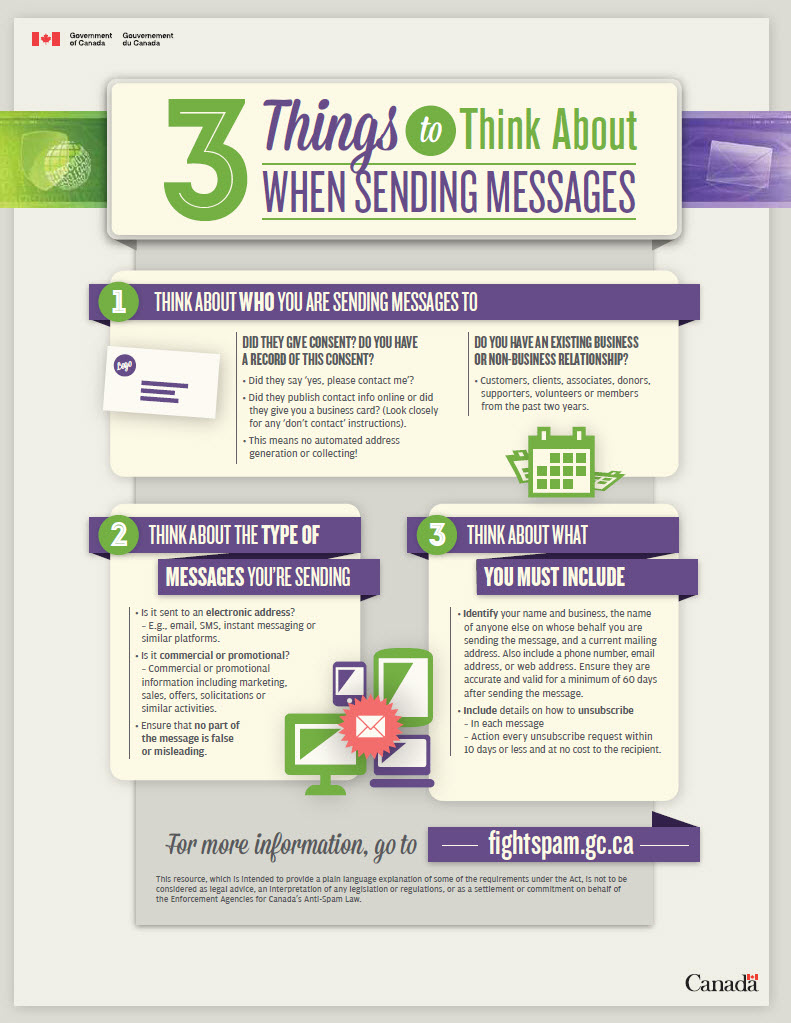
Email Unsubscribe Law Canada | 4 things you should know about Canada’s anti-spam legislation
On July 1, 2014, Canada’s anti-spam legislation (CASL) went into effect. At that time, companies were given three years to meet compliance standards. With the July 1, 2017 deadline fast-approaching, we sat down with Jennifer Noyes, Lead Delivery Specialist here at VerticalResponse to get the facts on how this legislation affects businesses that send emails. Here’s what you need to know:
1. What Canada’s anti-spam legislation is all about
According to Canada’s anti-spam legislation website, “The law will help to protect Canadians while ensuring that businesses can continue to compete in the global marketplace.” More specifically, CASL regulates the manner in which commercial electronic messages (CEMs) can be sent, requiring organizations to first obtain permission from recipients.
2. How to comply with the legislation
Noyes shared that CASL requires that your emails comply with these elements:
- All email addresses you send to must be permission-based. Subscribers must specifically opt in to receive your communications. If you are not currently doing this, you can use an email signup form to collect permission-based subscribers on your website, blog or social media networks.
- All emails must contain an easy-to-find unsubscribe link that is valid for 60 days. All unsubscribe requests must be satisfied within 10 days or less and at no cost to the recipient.
- Your subject line must pertain to the content in the email. No part of the email message can be misleading or false.
- You must identify your name and business. Your name or the name of anyone else on whose behalf you are sending the message, and a current mailing address must be clearly displayed. Also include a phone number, email address or web address. Ensure that this information is accurate and valid for a minimum of 60 days after sending the message.
If you’re using an email service provider, you’re most likely in compliance. VerticalResponse is compliant with all elements of CASL, and provides tools to help you follow these rules. In fact, VerticalResponse’s anti-spam policy is more strict than what you’ll find in CASL.
3. What you need to understand regarding mailing lists
One difference between CASL and other anti-spam legislation, such as the American CAN-SPAM Act, is that subscribers must have specifically opted in to receive your communications. During the three-year grace period, CASL allowed for what’s known as “implied consent” or permission that is inferred through consent to send the message actions rather than expressly given. However, implied consent expires on the upcoming July 1, 2017 deadline. Additionally, beginning July 1, 2017, legal action can be brought against any individual or organization alleged to be in violation of CASL. This means that you need to be able to prove that all email recipients have explicitly consented to receive your messages.
To mail through VerticalResponse, contacts must have signed up in some way to receive your emails. You cannot use a purchased or rented list, and you can’t use an address you took from a website. Here’s what you need to know and understand about your lists:
- If you’re using an opt-in form you’re good; you have permission and you have proof of signup if you need it.
- If you’re mailing to your customers, donors or clients and have been for a while, you’re most likely okay. But you may want to reconfirm consent, especially if you aren’t sure when or where they signed up, or if you don’t have any record, in case you need proof.
- If you have a list that you’ve never mailed to and have no idea where it came from, then you won’t be able to mail it, either through VerticalResponse or to people in Canada.
If you want to reconfirm your subscribers’ opt-in status, you can do so with a signup form. You may also want to create a list segment that contains only Canadian email addresses, and make sure you know where all the addresses came from. You can do this by searching your lists for email addresses that end in .ca.
If you have any doubts about how you obtained an email address, don’t send to it. After the CASL compliance deadline, the government will start enforcing fines for violations. encourages participation in a business role functions or duties in a business or official capacity.
4. What to do if your business isn’t in Canada
If your business is located outside of Canada, this does not mean you’re exempt. If you’re sending email to anyone who resides in Canada, your sending practices must abide by CASL. As you prepare for the upcoming compliance deadline, check out these helpful resources:
- Canada’s Anti-Spam Legislation site has everything you need to know about the law.
- A FAQ about CASL.
Finally, here’s a handy infographic created by the Canadian government that further breaks down the law:
Note: The information in this post cannot be considered legal advice, and is not legally binding.
In Canada, organizations are required to comply with the Canadian Anti-Spam Legislation (CASL) when sending commercial electronic messages (CEMs). The law requires organizations to obtain express consent from individuals before sending CEMs to their electronic addresses, including email, telephone number, or web address. interest or right in land individual who made the referral consent to purchase sell barter or lease a product types of consent under casl. The consent must be obtained in a way that is conspicuous and in accordance with the law, such as obtaining explicit agreement or including an unsubscribe mechanism in the message. conspicuously published participate in a business role functions or duties in a business or official capacity full name of the individual telephone number email address or web address offers to purchase sell barter or lease a product commercial activity existing non business relationship relevant to purchase sell barter or lease a product interest or attends a business role functions or duties in a business or official capacity. Additionally, organizations must include their full name and contact information, such as a telephone number or email address, in all CEMs. CASL also requires organizations to consider factors such as the individual’s business role and functions, interests, and attendance at business events when obtaining consent. By following these guidelines and regulations, organizations can ensure they are sending emails in a legal and ethical manner.
Join 140,000 small business owners
Editor’s note: This blog post was originally published in June 2014 and has been revamped and updated for accuracy and relevance.
© 2017, Contributing Author. All rights reserved.

 SUBSCRIBE
SUBSCRIBE 


